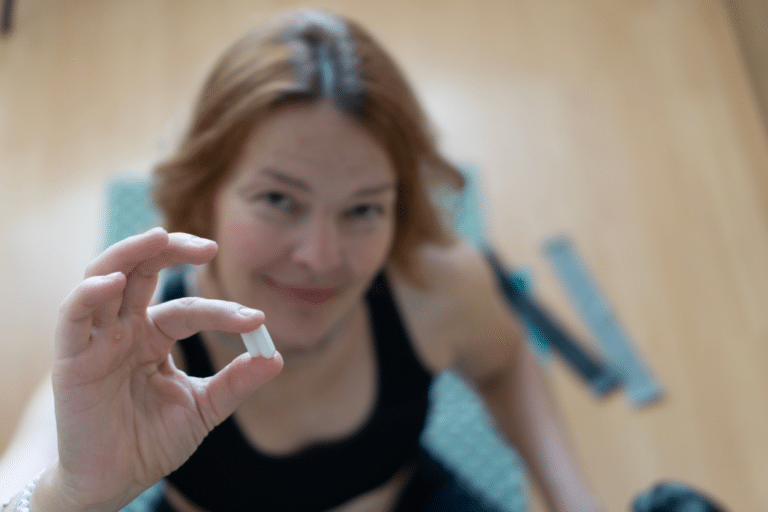Perimenopause can be challenging for many women, especially regarding weight gain.
Meno-middle (weight gain in the abdomen) is one of the most common complaints of my clients, and healthcare professionals have told most of them that an extra 10–20 pounds is simply a rite of passage at this time of

life, and they should just accept their “middle-age spread.”
This is crap.
Unfortunately, it’s not just about willpower. Or calories in, calories out.
There are hormone imbalances to consider, but the likelihood is that you may have a Vitamin P deficiency.
“What is this Vitamin P?” you may ask.
It’s pleasure.
Show me a woman who’s gaining weight, and I am willing to bet she has dramatically cut calories, is endlessly obsessing over food, and is living on her Peloton. The diet industry and our culture tells us that the weight loss battle includes a fun-free diet, grueling workouts, and white-knuckle willpower. But it doesn’t work over the long haul. As humans, we are not wired to live this way.
When we separate pleasure from food, we alter the biochemical responses in our brains. This results in carb cravings, decreased absorption of nutrients, and slowed fat burning.
Often, we associate the pleasure of food with weight gain. When we enjoy food “too much,” the thinking goes, we’ll surely over-indulge and pack on extra pounds. Actually, the reverse is often true. Pleasure, when approached in a healthy way, can help us lose weight!
The Biochemistry of Pleasure and Food
Neuropeptide Y
One of the chemicals that increases our appetite is neuropeptide Y. It tells us to search for food. Its levels naturally elevate in the morning, which makes sense because that’s when the body is readying itself for action. Neuropeptide Y also boosts whenever we deprive ourselves of food. Its presence particularly increases after dieting. Whenever we sink into a low blood sugar state – which usually means we are also in a low mood – neuropeptide Y levels rise and signal us to consume carbohydrates. Hello, Oreos!
So if you deny yourself the pleasure of food with low-calorie eating or restrict yourself, the body responds by chemically demanding pleasure and satisfaction. The lesson that neuropeptide Y teaches us is that we cannot escape the biological wiring to party and enjoy. No matter how stingy we are with eating, the body will not be denied.
Endorphins
Next, we have endorphins. Endorphins are the chemicals most people associate with pleasure. The brain and digestive system produce them. Eating raises our levels of endorphins, which tells us that eating is an inherently pleasurable experience (because it should be). The other less well-known thing about endorphins is that they stimulate fat to be burned as fuel. The greater the endorphin release in your digestive tract, the more blood and oxygen delivered there, which means greater metabolic efficiency.
Cholecystokinin (CCK)
The third piece of the biochemical puzzle is cholecystokinin, CCK. The body produces CKK in response to protein or fat in a meal and performs several functions. First, it directly helps digestion by stimulating the small intestines, pancreas, gallbladder, and stomach. Second, when it’s released in the hypothalamus (a part of the brain), it shuts down appetite. And it also stimulates the sensation of pleasure in the cerebral cortex, the highest portion of the brain.
So, in putting all this together, we find that the same chemical that metabolizes our meal also tells us when it’s time to finish that meal, making us feel good about the entire experience. It shows us how pleasure, metabolism, and a naturally controlled appetite are extremely interwoven. Most people think pleasure is completely separate from the nutritional process and serves no metabolic function. We often believe that if food makes us feel good, the body is automatically stimulated to eat more and might never want to stop. The actions produced by CCK in the brain tell us a whole new story.
The Bottom Line
The truth is that weight loss is not about willpower or calories in/calories out. Both are myths fed to us by the diet industry that ultimately doom us to failure. Fad diets don’t work because they strip out pleasure and completely wreck an exquisite biochemical process that is more complicated during menopause because of hormone imbalances that work against weight loss. Worrying about weight gain causes us to strip out the most pleasurable aspects of food, an approach that is likely to backfire quickly. This is in addition to the cortisol increase that all that worry produces.
Try adding back some pleasure into your mealtime. If you eat healthy foods 90% of the time and allow yourself to eat “pleasure” foods 10% of the time, you will be fine. And remember, pleasure doesn’t just apply to food choices. It can mean setting a beautiful table, playing relaxing music, or lingering over your meal. You decide!
Dr. Anna Garrett is a menopause expert and Doctor of Pharmacy. She helps women who are struggling with symptoms of perimenopause and menopause find natural hormone-balancing solutions so they can rock their mojo through midlife and beyond. Dr. Anna is the author of Perimenopause: The Savvy Sister’s Guide to Hormone Harmony. Order your copy at www.perimenopausebook.com.
Also, she offers a membership group, Hormone Harmony with Dr. Anna Garrett, which provides women in midlife with affordable expert guidance and community support.
Dr. Anna is available for 1-1 consultation. Find out more at www.drannagarrett.com/lets-talk




